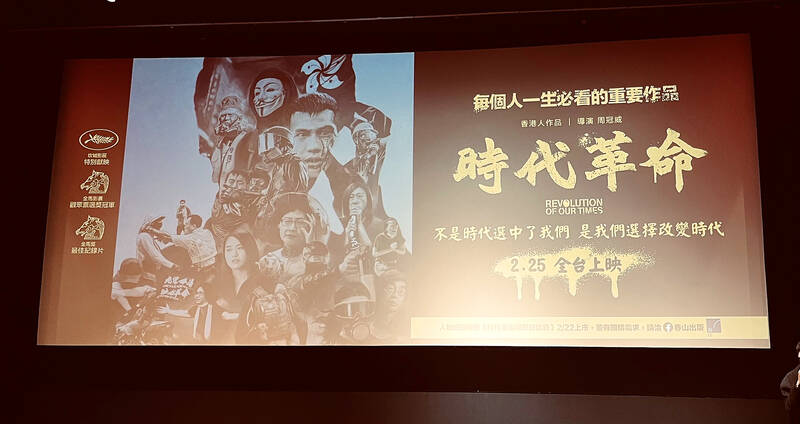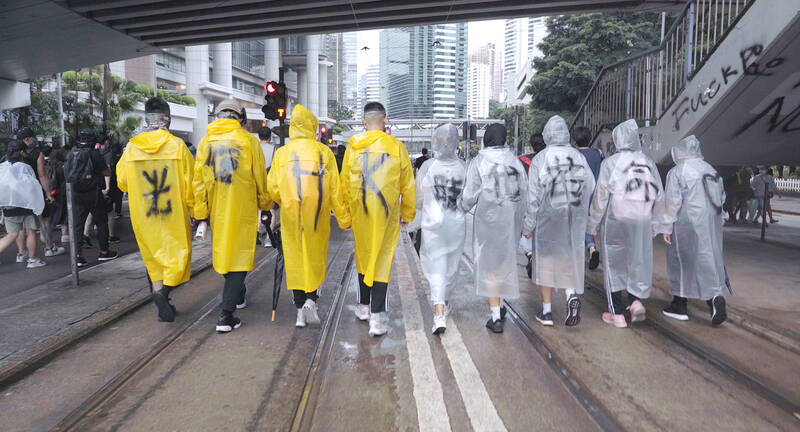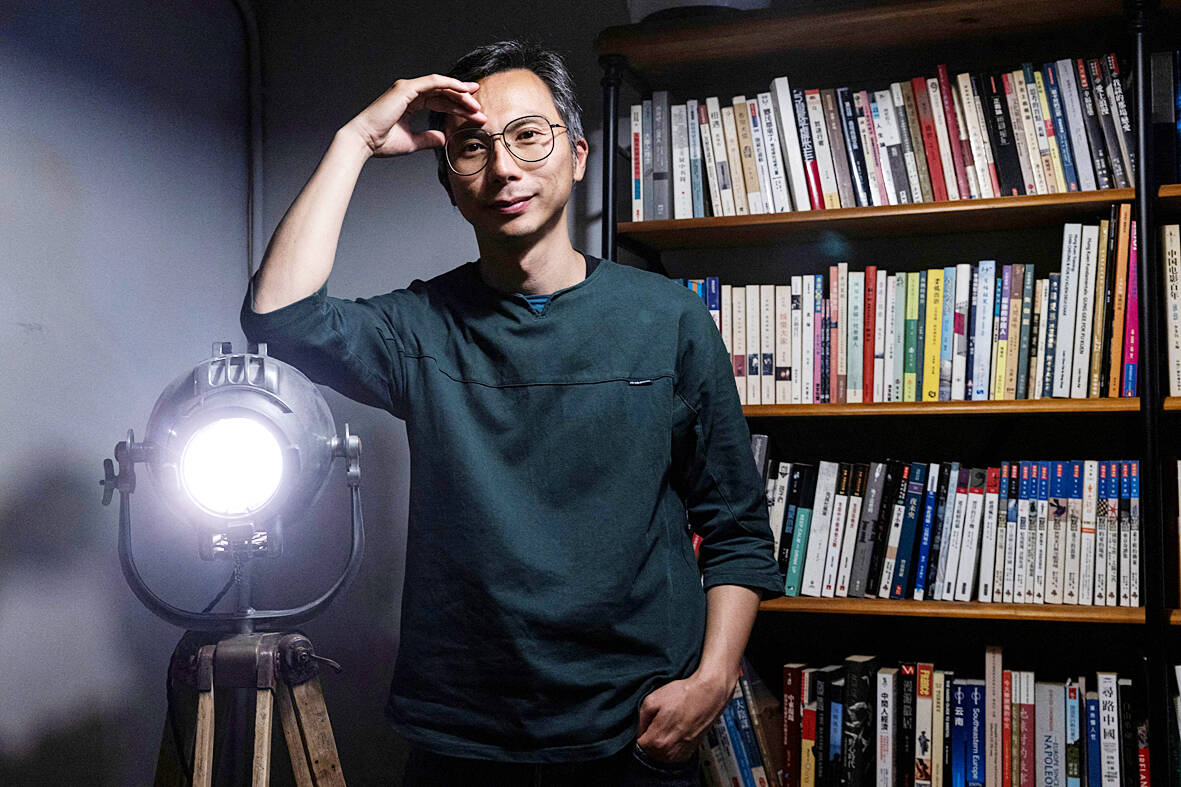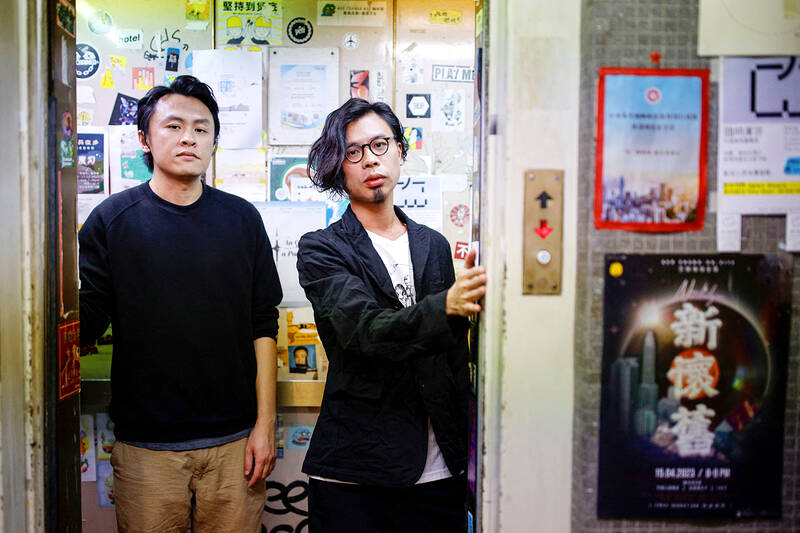Two years after screening an internationally acclaimed documentary on the democracy movement in Hong Kong, director Kiwi Chow (周冠威) has been forced to complete a new movie with fresh financing after political concerns scared off some investors.
The fears spiked after Hong Kong adopted a new censorship law in October 2021 to bar films that “might endanger national security,” but directors say they now face difficulties lining up funding and even actors, while others have shifted overseas.
“Actors under the Hong Kong film companies are very afraid, and this fear shadows everything,” said Chow, who felt the situation had made performers, and investors, apprehensive about crossing ill-defined “red lines” concerning national security.

Photo: Chen Yu-fu, Taipei Times
“This is what makes it scary, it doesn’t need to suppress you directly, but it has already made all these people scared,” he added.
Chow, feted at the Cannes film festival in 2021 for his documentary, Revolution of Our Times (時代革命), said it was clear when the new law came in that film makers would have to steer clear of political topics.
But he did not realize then that people would be so risk-averse, even if he had not been found guilty of anything.

Photo courtesy of Revolution of Our Times
The censorship measure, which follows a national security law China imposed on the Asian financial hub in 2020, means directors now need to steer clear of some topics to avoid putting investors and actors at risk, some filmmakers said.
At least 21 movies and short films have had scenes cut or their release blocked by Hong Kong’s Office for Film, Newspaper and Article Association (OFNAA) since October 2021, a tally showed.
In an E-mail statement, the office said it had processed about 5,000 applications for film classification since January 2021, denying approval for public exhibition to six of them.But it declined to comment on individual films.

Photo: REUTERS
FUNDING PULLED
Since 2005, the former British colony has injected nearly US$200 million into the Film Development Fund. But in February, its culture secretary, Kevin Yeung (楊潤雄), warned that funds would not be allocated to film projects that might infringe the 2020 law.
It is not immediately clear how much censorship measure has affected such funding.

Photo: REUTERS
Replying to a query, Hong Kong’s Film Development Council, which is mainly responsible for government funding of the industry, said in an email it would have to look into the matter before responding.
Yet film-makers see little room for maneuvers.
Chow scrambled to complete his new film after investors pulled 80 percent of its US$1 million funding and the main actor withdrew.

Photo: REUTERS
Although his film, Say I Do To Me (一人婚禮), a love story about a young woman who embarks on a journey of self-discovery, is far from political, Chow said investors told him they could not take the risk as they still had to do business with China.
“For them, Revolution of Our Times is a very sensitive movie,” Chow added. “They think they have business with China, so even if there is little risk, they all find it unacceptable, not to mention that in their eyes, this is a very high risk.”
In response to a query, a police spokesman declined to clarify whether watching or downloading the film was illegal, however.

Photo: Wang Yi-sung, Taipei Times
About 40 to 50 supporters injected fresh funding to help him complete it, he added.
“Revolution of Our Times made me lose a lot of things, but it has also attracted some other new funding.”
Some actors who wanted to participate in the new film were either pressed not to do so by their management companies, or told by producers that scenes featuring them would be cut from other movies, Chow said.
Some told Chow they had signed contracts barring them from making speeches that violate the national security law or co-operating with people considered a political risk.
“These contracts use economic pressure to restrain them, so that they cannot speak up,” he said.
TABOO TOPICS
The makers of three short films screened at the Fresh Wave International Film Festival in June “had chosen to replace the deleted parts with black images and muted sound” after they were censored, organizers said.
Rex Ren (任俠) and David Chan (陳浩勤), co-founders of independent production group Phone Made Good Film, said they had no plan to seek government funds and would keep to small budgets instead.
“It’s because we need to create, so we persist in Hong Kong,” Ren said.
The day before their Loose Narratives short film festival began in April, censors denied approval for their short film Wake in Silence, citing “possible seditious intentions.”
The scene in question showed a flag of the now disbanded pro-democracy party Demosisto with the slogan, “100% Freedom.”
The tale of a girl who misses her boyfriend after he left the city was the third film censored in the festival.
“I already feel that the need to be safe has increased a lot, and there are some topics that have become taboo,” said Ho Cheuk-Tin (何爵天), adjudged Best New Director at this year’s Hong Kong Film Awards for his film, The Sparring Partner (正義迴廊).
Ho, who has been busy promoting his second movie, Over My Dead Body (死屍死時四十四), a comedy about the frenzied real estate market, has chosen to stay on, however.
“I consider myself more commercial, but I still hope to have lots of Hong Kong elements in my movies,” he said.
Others, in contrast, have moved abroad to take Hong Kong films to the diaspora communities and global audiences in Britain, Canada and the US.
“We are scared of the disappearance of the culture and art of Hong Kong,” said Ching Wong (王靜), who founded Hong Kong Film Festival UK along with director Ng Ka Leung (伍嘉良)in 2021. It held more than 60 screenings across seven British cities in March.
Still, for those at home, the scenario remains bleak.
“At this moment, the chance of me finding funds in the Hong Kong market and the Hong Kong government seems to be close to zero,” film-maker Chow said.

Last week saw the appearance of another odious screed full of lies from the People’s Republic of China (PRC) Ambassador to Australia, Xiao Qian (肖千), in the Financial Review, a major Australian paper. Xiao’s piece was presented without challenge or caveat. His “Seven truths on why Taiwan always will be China’s” presented a “greatest hits” of the litany of PRC falsehoods. This includes: Taiwan’s indigenous peoples were descended from the people of China 30,000 years ago; a “Chinese” imperial government administrated Taiwan in the 14th century; Koxinga, also known as Cheng Cheng-kung (鄭成功), “recovered” Taiwan for China; the Qing owned

In Taiwan’s politics the party chair is an extremely influential position. Typically this person is the presumed presidential candidate or serving president. In the last presidential election, two of the three candidates were also leaders of their party. Only one party chair race had been planned for this year, but with the Jan. 1 resignation by the currently indicted Ko Wen-je (柯文哲) of the Taiwan People’s Party (TPP) two parties are now in play. If a challenger to acting Chairman Huang Kuo-chang (黃國昌) appears we will examine that race in more depth. Currently their election is set for Feb. 15. EXTREMELY

Jan. 20 to Jan. 26 Taipei was in a jubilant, patriotic mood on the morning of Jan. 25, 1954. Flags hung outside shops and residences, people chanted anti-communist slogans and rousing music blared from loudspeakers. The occasion was the arrival of about 14,000 Chinese prisoners from the Korean War, who had elected to head to Taiwan instead of being repatriated to China. The majority landed in Keelung over three days and were paraded through the capital to great fanfare. Air Force planes dropped colorful flyers, one of which read, “You’re back, you’re finally back. You finally overcame the evil communist bandits and

They increasingly own everything from access to space to how we get news on Earth and now outgoing President Joe Biden warns America’s new breed of Donald Trump-allied oligarchs could gobble up US democracy itself. Biden used his farewell speech to the nation to deliver a shockingly dark message: that a nation which has always revered its entrepreneurs may now be at their mercy. “An oligarchy is taking shape in America of extreme wealth, power and influence that literally threatens our entire democracy, our basic rights and freedoms,” Biden said. He named no names, but his targets were clear: men like Elon Musk